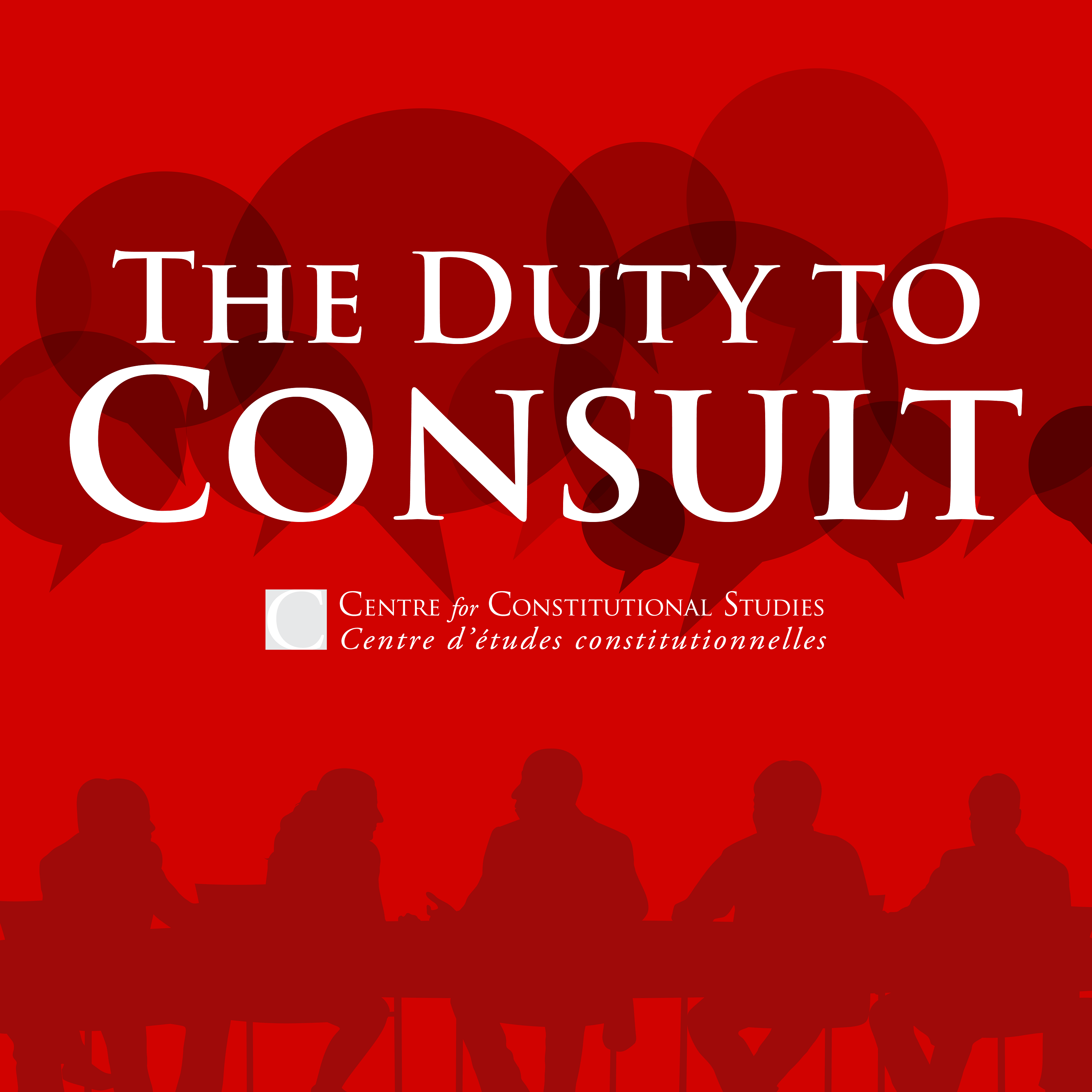The Duty to Consult
The “duty to consult” requires consultation with Indigenous groups when government action may impact “Aboriginal and treaty rights”. Through interviews with legal experts, this four-part series explores what the duty to consult is, where it comes from, and how it might change in future. Listen to learn more about Canadian Aboriginal Law, its interaction with Indigenous Laws and the United Nations Declaration on the Rights of Indigenous Peoples. Developed by student researchers at the Centre for Constitutional Studies, University of Alberta. None of the information in this podcast series constitutes legal advice.
Episodes

Wednesday Mar 09, 2022
Wednesday Mar 09, 2022
Meaghan Conroy (Partner, MLT Aikins LLP) discusses the United Nations Declaration on the Rights of Indigenous Peoples (UNDRIP), and An Act respecting the United Nations Declaration on the Rights of Indigenous Peoples (Bill C-15). She explores what impact UNDRIP and Bill C-15 may have on Canadian Aboriginal Law – particularly the duty to consult.
Meaghan Conroy is a Partner with MLT Aikins and works with First Nation and Métis individuals, communities, governments, and organizations.
References & Further Reading
Nigel Bankes, Martin Olszynski and David Wright, “Federal Court of Appeal Provides Reasons in TMX Leave Applications” (September 11, 2019), online: ABLawg,
United Nations Declaration on the Rights of Indigenous Peoples, GA Res 61/295 (Annex), UN GAOR, 61st Sess, Supp No 49, Vol III, UN Doc A/61/49 (2008) 15.
Podcast Creators: Tesia Doblanko, Liz England, and Zachary Gee
Student Researchers
Editing by: Richard Mailey, Research Associate and Mike Contos
Music by: Richard Mailey, Research Associate

Wednesday Mar 02, 2022
Wednesday Mar 02, 2022
Sara Mainville (Partner, Olthuis Kleer Townshend LLP) discusses what the duty to consult means from an Anishinaabe perspective. She explains how Indigenous Law relates to the duty to consult, treaty-making, and reconciliation. We also touch upon the United Nations Declaration on the Rights of Indigenous Peoples.
Sara Mainville is a Partner at Olthuis Kleer Townshend LLP and works with First Nations, not only as a lawyer, but as a negotiator and advisor. She was elected Chief of Couchiching First Nation in 2014.
References & Further Reading
United Nations Declaration on the Rights of Indigenous Peoples, GA Res 61/295 (Annex), UN GAOR, 61st Sess, Supp No 49, Vol III, UN Doc A/61/49 (2008) 15.
Sara Mainville, “Hunting Down a Lasting Relationship with Canada — Will UNDRIP Help?” (2020) 57:1 Osgoode Hall LJ 98, online: Journals at Osgoode Digital Commons https://digitalcommons.osgoode.yorku.ca/cgi/viewcontent.cgi?article=3583&context=ohlj
Haida Nation v British Columbia (Minister of Forests), 2004 SCC 73
Podcast Creators: Tesia Doblanko, Liz England, and Zachary Gee
Student Researchers
Editing by: Richard Mailey, Research Associate and Mike Contos
Music by: Richard Mailey, Research Associate

Wednesday Feb 23, 2022
Wednesday Feb 23, 2022
Professor John Borrows discusses what Indigenous Law and Aboriginal Law are, and how Indigenous Law relates to the duty to consult.
John Borrows is a Professor and the Canada Research Chair in Indigenous Law at the University of Victoria’s Faculty of Law. He was appointed as an Officer of the Order of Canada in 2020, and is a member of the Chippewa of the Nawash First Nation in Ontario. Professor Borrows has researched, published, taught, and presented extensively on Indigenous Law and the Canadian Constitution.
References & Further Reading
John Borrows, Law’s Indigenous Ethics (Toronto: University of Toronto Press, 2019).
John Borrows, Canada’s Indigenous Constitution (Toronto: University of Toronto Press, 2010).
Chippewas of the Thames First Nation v Enbridge Pipelines Inc., 2017 SCC 41.
Harold Johnson, Two Families: Treaties and Government (Saskatoon: Purich Publishing, Limited, 2007).
Mikisew Cree First Nation v Canada (Governor General in Council), 2018 SCC 40.
National Centre for Truth and Reconciliation, “Reports”, online: National Centre for Truth and Reconciliation < https://nctr.ca/records/reports/ >.
R v Marshall, [1999] 3 SCR 456.
R v Van der Peet, [1996] 2 SCR 507.
Tsilhqot’in Nation v British Columbia, [2014] 2 SCR 257.
United Nations Declaration on the Rights of Indigenous Peoples, GA Res 61/295 (Annex), UN GAOR, 61st Sess, Supp No 49, Vol III, UN Doc A/61/49 (2008) 15.
Podcast Creators: Tesia Doblanko, Liz England, and Zachary Gee
Student Researchers
Editing by: Richard Mailey, Research Associate and Mike Contos
Music by: Richard Mailey, Research Associate

Wednesday Feb 16, 2022
Wednesday Feb 16, 2022
Episode 1: Interview with Professor Eric M. Adams
Vice Dean and Professor Eric M. Adams (University of Alberta) walks us through the duty to consult doctrine’s background, context, purpose, and basics. He also discusses some key cases concerning the duty to consult.
Eric M. Adams is Vice Dean and Professor at the University of Alberta’s Faculty of Law. He has won numerous teaching and research awards and his areas of expertise include constitutional law and theory.
References & Further Reading
Clyde River (Hamlet) v Petroleum Geo-Services Inc, 2017 SCC 40.
Coldwater First Nation v Canada (Attorney General), 2020 FCA 34.
Haida Nation v British Columbia (Minister of Forests), 2004 SCC 73.
Mikisew Cree First Nation v Canada (Governor General in Council), 2018 SCC 40.
R v Sparrow, [1990] 1 SCR 1075, 1990 CanLII 104.
Rio Tinto Alcan Inc v Carrier Sekani Tribal Council, 2010 SCC 43.
Podcast Creators: Tesia Doblanko, Liz England, and Zachary Gee
Student Researchers
Editing by: Richard Mailey, Research Associate and Mike Contos
Music by: Richard Mailey, Research Associate

The Duty to Consult
The “duty to consult” requires consultation with Indigenous groups when government action may impact “Aboriginal and treaty rights”. Through interviews with legal experts, this four-part series explores what the duty to consult is, where it comes from, and how it might change in future. Listen to learn more about Canadian Aboriginal Law, its interaction with Indigenous Laws and the United Nations Declaration on the Rights of Indigenous Peoples. Developed by student researchers at the Centre for Constitutional Studies, University of Alberta. None of the information in this podcast series constitutes legal advice.






